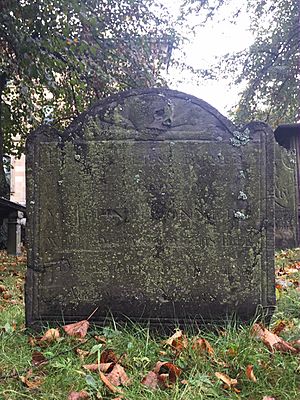Attack at Mocodome facts for kids
Quick facts for kids Attack at Mocodome |
|||||||
|---|---|---|---|---|---|---|---|
| Part of Father Le Loutre's War | |||||||
 John Connor, Old Burying Ground (Halifax, Nova Scotia) |
|||||||
|
|||||||
| Belligerents | |||||||
| Mi'kmaq | |||||||
| Commanders and leaders | |||||||
| unknown |
|
||||||
| Strength | |||||||
| unknown | |||||||
| Casualties and losses | |||||||
| 6 Mi'kmaq | 2 killed, 2 prisoners | ||||||
The attack at Mocodome was a battle that happened on February 21, 1753. It took place in a small harbour called Mocodome, which is now known as Country Harbour, Nova Scotia. During this fight, two British sailors and six Mi'kmaq people lost their lives. This event was a major setback for the Treaty of 1752. This treaty had been signed by Governor Peregrine Hopson and Mi'kmaq chief Jean-Baptiste Cope, hoping to bring peace.
Why This Happened: Historical Context
Even after the British took control of Acadia in 1710, most of Nova Scotia was still home to Catholic Acadians and Mi'kmaq people. When Edward Cornwallis arrived in 1749 to start the city of Halifax, there was already a long history of conflict. The Wabanaki Confederacy, which included the Mi'kmaq, often attacked British settlers trying to build new towns.
The Mi'kmaq wanted to stop the British from settling permanently in the area. They had raided British settlements like Shelburne and Canso years before. Father Le Loutre's War began when Cornwallis arrived in Halifax. The British quickly started building more settlements.
To protect these new towns from Mi'kmaq, Acadian, and French attacks, the British built forts. These forts were in places like Halifax (1749), Bedford (1749), Dartmouth (1750), Lunenburg (1753), and Lawrencetown (1754). There were many raids by the Mi'kmaq and Acadians on these villages, such as the Raid on Dartmouth (1751).
After a raid on Dartmouth in 1749, Governor Cornwallis offered a reward for capturing or harming Mi'kmaq people.
After about a year and a half of fighting, both the Mi'kmaq and the British started to have doubts. By the summer of 1751, Governor Cornwallis began to try a more peaceful approach. In February 1752, he removed the reward he had offered against the Wabanaki Confederacy. Cornwallis tried for over a year to find Mi'kmaq leaders who would talk about peace. Eventually, he gave up, resigned, and left the colony.
A new governor, Peregrine Thomas Hopson, took over. The first Mi'kmaq leader willing to talk was Chief Cope. On November 22, 1752, Cope finished negotiating a peace treaty for the Mi'kmaq at Shubenacadie. This treaty was based on an earlier one signed in Boston that ended Dummer's War (1725). Cope tried to get other Mi'kmaq chiefs in Nova Scotia to agree to the treaty, but he was not successful. The Governor became unsure if Cope truly spoke for all the Mi'kmaq people. Also, the French and Father Le Loutre were very angry that Cope had decided to negotiate with the British at all.
The Battle at Mocodome
One story, told by Charles Morris, says that John Connor and three other sailors were on a British ship called the Dunk. They sailed from Canso, Nova Scotia to Jeddore and took 40 barrels of supplies that belonged to the Mi'kmaq. These supplies had been given to the Mi'kmaq by the Governor.
On February 21, 1753, at what is now Country Harbour, nine Mi'kmaq from Antigonish attacked Connor and his three crew members: James Grace, Michael Haggarthy, and John Power. The Mi'kmaq shot at them and forced them towards the shore. Other Mi'kmaq joined in and got onto the ship, making the sailors run their vessel into a small inlet. The Mi'kmaq then captured and killed Haggarthy and Power. Connor and Grace were taken prisoner for seven weeks.
After seven weeks, on April 8, Connor and Grace managed to kill six Mi'kmaq. They then escaped from their captors.
Another story, told by Anthony Casteel, says something different. After taking supplies from the Mi'kmaq at Jeddore, the Dunk ship accidentally crashed, and two of the four crew members drowned. The two survivors, Connor and Grace, were then shown kindness by the Mi'kmaq. However, despite this hospitality, they killed seven Mi'kmaq. After this, the Mi'kmaq reportedly went to Halifax to complain that their supplies were being taken during the fishing season.
A French officer at Louisbourg said that Casteel's story didn't have enough proof. He also questioned why Connor and Grace would kill Mi'kmaq for money, since Governor Cornwallis had ended the reward for Mi'kmaq prisoners the year before.
What Happened Next
In response to these events, on the night of April 21, Mi'kmaq leader Jean-Baptiste Cope led an attack on a British ship at Jeddore. There were nine British sailors and one Acadian, Anthony Casteel, who was working as an interpreter. The Mi'kmaq killed the sailors. They let Casteel go at Port Toulouse, and then sank the ship after taking its supplies.
Most other Mi'kmaq leaders did not accept Cope's peace treaty. Cope himself burned the treaty six months after he signed it. Even though peace fell apart on the eastern shore, the British did not officially cancel the Treaty of 1752 until 1756.
See also
- List of massacres in Canada
 | Stephanie Wilson |
 | Charles Bolden |
 | Ronald McNair |
 | Frederick D. Gregory |

